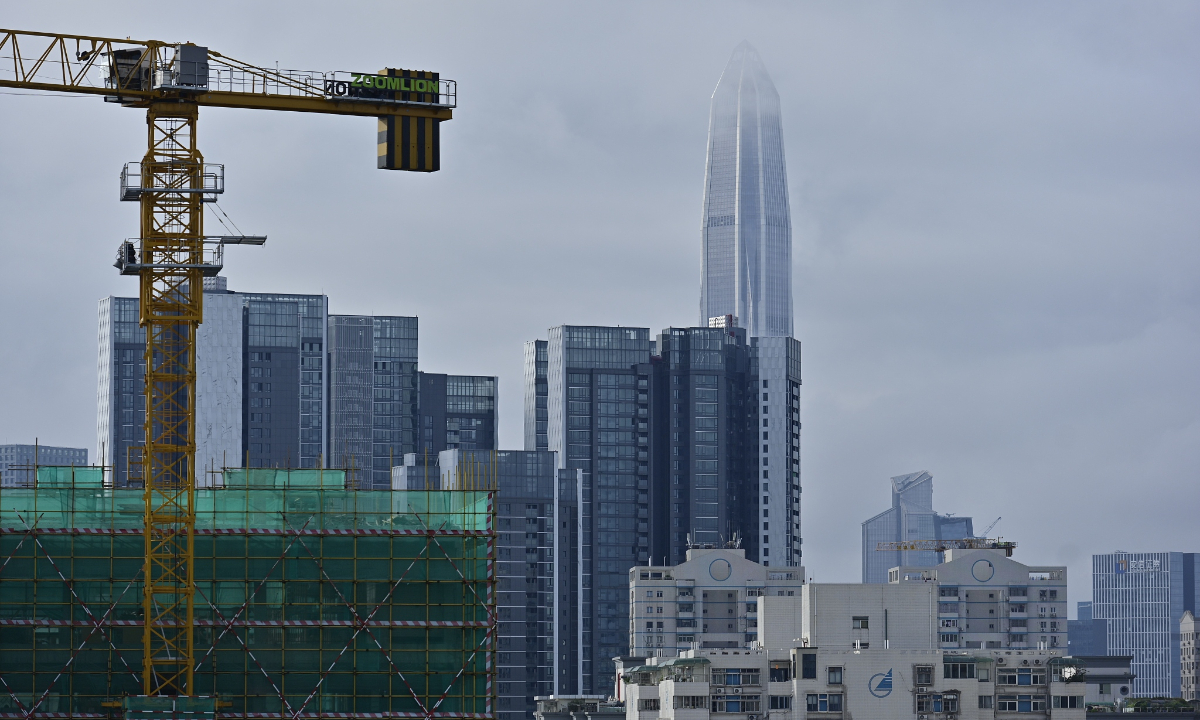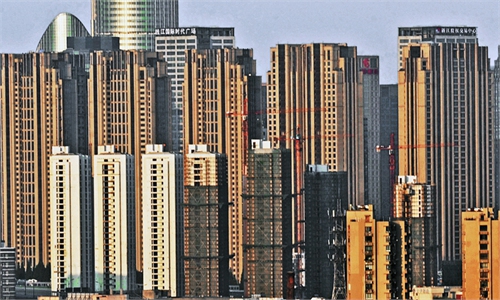Multiple real estate projects resume construction in China after homebuyers refuse to pay their mortgages for unfinished housing
Ensuring housing delivery to homebuyers is a top priority: experts

Shenzhen real estate Photo:VCG
Multiple real estate projects in China have resumed construction, after some disgruntled homebuyers denied to pay their mortgages for unfinished or stalled housing projects as cash-strapped property developers run out of cash, domestic news outlet Financial News reported on Saturday.
A housing project belonging to Greenland Holdings Co in Ganzhou, East China's Jiangxi Province has resumed construction lately. Construction workers were spotted reentering the construction site. Following negotiation, the regional government there decided to purchase part of the project's land which had not yet begun construction and return nearly 400 million yuan ($59.2 million) of land transfer fees to Greenland according to the progress of the construction, the news report said.
Another housing project named Mingmen Cuiyuan in Zhengzhou, Central China's Henan Province, is expected to resume construction in August. Multiple departments, including the project's developer and the developer's actual controller, have set up a special fund to promote the resumption of the housing project.
A subsidiary of the debt-ridden China Evergrande Group whose businesses concentrate in the Pearl River Delta region in southern China, said on its Wechat account on Friday that 59 of its housing projects across the region have resumed construction, with over 12,000 workers active on construction sites.
It is good news showing that property developing companies are actively attempting to resume housing construction, Yan Yuejin, research director at Shanghai-based E-house China R&D Institute, told the Global Times on Saturday.
Local governments and developers cooperating to solve the funding problem could offer examples for other similar delayed housing projects to restart, Yan said, noting that it is of great significance for the related partied to sit down and negotiate and come up with feasible scenarios to resume projects construction.
He predicted that the instances of "halting mortgage repayments" by the disgruntled homebuyers will be gradually addressed in the country.
The phenomenon of some homebuyers halting mortgage repayments to banks came under media spotlight recently, with some 100 delayed housing projects scattered across 18 provinces. Involved real estate developers include Evergrande, Greenland Holdings, China Aoyuan Group and others, according to media reports.
Yan emphasized that ensuring on-time housing delivery is a top priority to address mortgage defaults, to avoid turning economic problems into social problems.
Song Ding, a research fellow at the Shenzhen-based China Development Institute, was more cautious, saying that whether the stalled projects resumption could be sustained remains to be seen given the liquidity pressure facing the cash-strapped developers.
With different parties joining hands to solve the funding problem, it is hoped that the developers could take the opportunity to find a way to restart the stalled housing projects, Song said.
In the long run, the pre-sale mode of properties, under which homebuyers pay mortgages before obtaining finished housing, should be reformed to offer more failsafe protections for homebuyers, Song said.
The news also has implications for the financial sector security. Over 10 Chinese banks confirmed that, as of Thursday, unpaid or delayed mortgage payments were equal to nearly 2 billion yuan which was a relatively small amount compared to overall outstanding mortgages held by the banks, and they said related financial risks were controllable.
China Banking and Insurance Regulatory Commission is monitoring the development too, reiterating its goal of stabilizing financial policies in the real estate sector and step up efforts to guide financial institutions to mitigate the risks.
Overall investment in real estate development in China recorded 6.83 trillion yuan in the first half of the year, down 5.4 percent year-on-year, per data from the National Bureau of Statistics.

